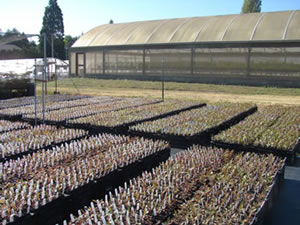 Over the past several years, we have been collecting seed from trees throughout the range of Pacific madrone to examine genetic variability with this species. Specific objectives are to:
Over the past several years, we have been collecting seed from trees throughout the range of Pacific madrone to examine genetic variability with this species. Specific objectives are to:
- Determine the relative susceptibility/resistance of seed sources of Pacific madrone from throughout the range of the species to Phytophthora ramorum, P. cinnamomi, and endemic canker and foliar pathogens that could be important factors under climate change and
- Provide the first baseline data on range-wide genetic variation in adaptation traits (e.g. growth) and resistance to pathogens.
BRIEF DESCRIPTION OF PROJECT:
- Establish common garden study at several widely separated field sites in WA, BC, OR and CA.
- Examine adaptive characteristics of Pacific madrone from all populations being tested.
- Screen for resistance to native and non-native, invasive pathogens (this will mainly be done under controlled laboratory conditions).
- Gene Conservation: Collect additional seed sources and maintain seed collection for entire range of Pacific madrone that can be used for research projects and conservation purposes.
Pacific madrone is a very wide ranging species along the West Coast of North America, but little baseline data is available on its genetic variability. The species has been in decline for several decades due to endemic canker and foliar diseases aggravated by changes in climate and land use. In the presence of changing climate and new non-native invasive pathogens (e.g. P. ramorum) information on variation in adaptive traits and in disease resistance will help us understand the capacity of this species to survive. Extensive seed collections are now available for a wide range of tests. The establishment of field sites will allow for longer term monitoring of the species, including which populations are most fit under current and changing environmental conditions within its native range.
Adaptive characteristics will be examined on seedlings from selected families using a common garden field trial in California, Oregon, Washington and BC. Seedlings will be planted in a randomized complete block design with 25 seedlings per family per site. The WSU Puyallup Pacific Madrone Seed Collection presently contains 236 seed sources (families) from 35 geographic locations. The locations of all source trees in the collection are GPS-mapped. Seed from 119 families has been grown and out-planted at field sites in fall 2011/winter 2012. For more information about this project click here.
Seed is available to researchers who are interested in other research projects.
Questions or comments? Email Marianne Elliott, Gary Chastagner, or Richard Sniezko